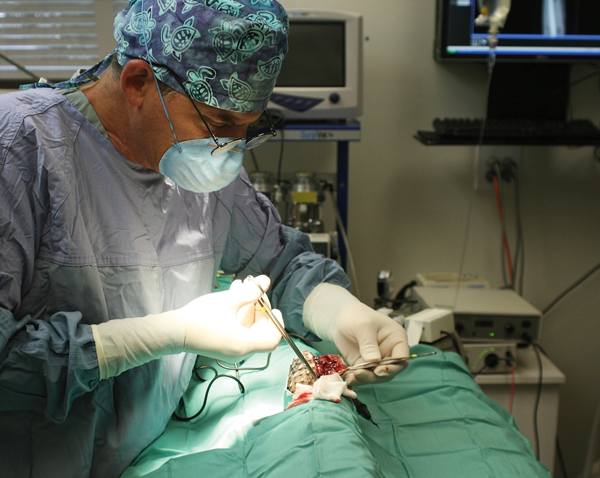I am frequently asked if I will perform veterinary work on “hot,” or venomous, species. The answer is yes. The “hot stuff” is
I am frequently asked if I will perform veterinary work on “hot,” or venomous, species. The answer is yes. The “hot stuff” is susceptible to all the same issues that non-venomous species are, with a few extras thrown in. Treating the hot stuff is not any different than treating the safe stuff from a medical perspective, with the exception that if you make a mistake handling the hot stuff, you could die.
More Vet Reports
The Vet Report: Herp First Aid Kit Checklist
The Vet Report: Inclusion Body Disease

douglas mader
Dr. Mader performing surgery on an Eastern diamondback rattlesnake.
Veterinarians, in general, are allowed to treat just about any animal that needs medical care. That is part of the veterinarian’s oath. That said, there are some excellent herp vets that will not work on venomous animals. That is their choice.
Where things get complicated concerning working on venomous species is the “elective” type of procedures. That means, where it may be legal to treat a sick rattlesnake in Anytown, USA, it may be illegal to perform a venemoid surgery on a rattlesnake in the same town.
I do treat venomous species in my hospital, but I have several very strict rules that must be followed. First, I do not treat pet venomous snakes unless the owner has a valid permit allowing him/her to keep the animal. Second, the snake must be secured inside a substantial snake bag that has been locked inside a solid transport cage. Third, if I do not have antivenin for the species being brought in, then the owner must bring the correct type of antivenin, in the correct dose to treat a person of my body weight. And finally, the antivenin must not be outdated.
I only take venomous reptile appointments at the end of the day, after the hospital is closed. I do not want crowds around, and I do not want to be distracted when I am working on the patient. It is not uncommon to see problems with venom apparatus or fangs. Perhaps the most common call I get for veterinary care is to perform venemoid surgery (removal of the venom gland).
If the venomous herp is ill, it will need a complete physical examination, as would any reptile. A thorough physical examination is mandatory for proper diagnosis and treatment, and it should include a hands-on evaluation. Laboratory testing such as blood tests and bacterial cultures may be needed, and additional diagnostics such as X-rays and ultrasounds may also be necessary. Of course, in order to do any of these things, it is mandatory that safety during handling be paramount.
There are many different ways to work with a venomous reptile that permit all of the above manipulations. Squeeze cages, snake tubes and hooks (used by an experienced handler) all allow necessary access to the patient. If required, the snake may be anesthetized for any procedures such as X-rays of the mouth, etc. Anesthesia will not hurt the animal, even if it is ill. I do not free catch, or pin and grab, a hot herp for an exam.
As far as treatment is concerned, it always has to be tailored to the patient, its particular needs, the experience of the handler, the equipment available and other factors. Choosing drugs that only have to be administered every few days can minimize manipulation and physical interactions. If an area such as the mouth needs to be treated, again, squeeze cages, snake tubes or, if necessary, anesthesia can be used. It is safe to anesthetize a snake every day if needed for treatments.
Treating venomous herps is possible and is done all the time. In fact, I often find it easier to treat hot animals than some large or aggressive non-venomous species. I am not alone in this; there are veterinarians all over the country that are skilled at handling and treating venomous species. You may have to travel to find one, and you may even have to visit one of the veterinary colleges where some of the experts are found.
Douglas R. MADER, MS, DVM, DABVP (C/F, R/A), DECZM (HERPETOLOGY), is a graduate of the University of California, Davis. He owns the Marathon Veterinary Hospital in the Conch Republic, and is a world-renowned lecturer, author and editor. He sits on the review boards of several scientific and veterinary journals.


